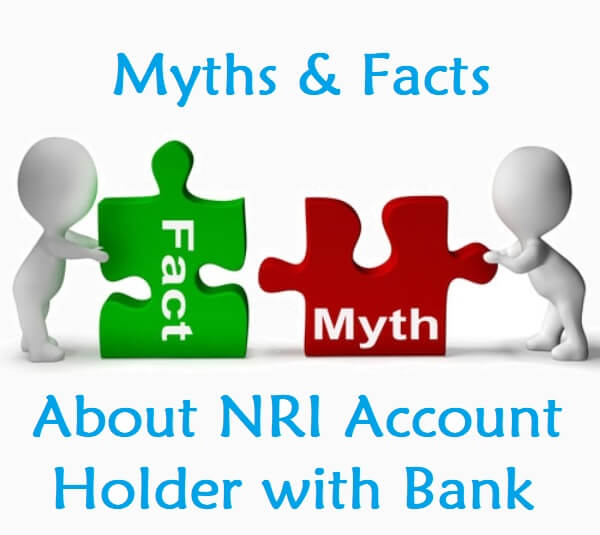Many Indians prefer to settle in foreign lands for better job prospects, earning money and completing higher studies. The Indian banking system has provided the facility of NRI accounts to operate all the financial activities from the different parts of the world. Before opening a NRI accounts in India, it is always advise that you know the benefits of NRI accounts. You can come across many rumors, here we are going to focus on myths and facts about NRI account rules in India.
Things to remember that citizens who have left the country have some financial responsibilities for their near ones. Before leaving the land carrying all the financial chores can be tedious, but some additional headaches can ruin your peace if you start believing the myths. Nevertheless, here we are providing genuine facts to explain you about the fallacious tales.
Myths and Facts about NRI Accounts Rules in India
There are few rules and things to remember when holding an NRI account in India. Let’s check the myths and facts about NRI account rules in India
Myth 1: All the NRI Savings Bank Accounts in India are the Same.
Fact: Most people might believe that after having an NRI status, the next step is to open an NRI account. However, NRI accounts are mainly of three types, and we will be discussing them in detail below.
Non-Resident Ordinary Account (NRO): Once an Indian decides to stay abroad, his existing savings bank accounts have to be converted into Non-Resident Ordinary Account (NRO). This is done following the guidelines provided by the RBI. In this particular account, the source of funds deposited should be of Indian origin. The interest earned on this account is liable for tax deduction at 30%.
If the account holder signs a letter of authorization for any particular person, then he/she can also conduct the financial operations on behalf. The NRO account can be opened jointly with an NRI or Indian resident, and there is provision to appoint a nominee as well.
Non-Resident External Account (NRE): This account can be opened by an NRI, though the funds have to be deposited from abroad. It is an Indian rupee dominated account, as the money gets converted into Indian currency at the time of deposit. The NRE account can be of three forms a saving, current, and fixed or recurring deposit.
The benefit of having this type of NRI account is that the money is fully repatriable, and interest earned is free from taxation. This account can be jointly operated with another NRI, but there are restrictions in opening the account with an Indian citizen. It can be easily converted into a resident account once the person returns to India.
Foreign Currency Non-Resident Account (FCNR): As an NRI, if you prefer to have a fixed deposit account in India, then you can select the Foreign Currency Non-Resident Account (FCNR). It is an outstanding tool of investment objectives for the NRIs to save their money, and earn better interest on it.
It comes with various facilities like managing the account in foreign currency, free repatriation of funds, and tax-free interest earning. Also, you can obtain an overdraft facility for your current and savings bank account against the FCNR fixed deposit scheme.
Myth 2: NRI cannot Invest in Stocks and Mutual Funds.
Fact: For investing in equities and mutual funds, an NRI requires to open NRE/NRO account. This account has to be further linked with the Portfolio Investment Scheme account (PIS) under a registered stockbroker or bank in India. You can also need to have knowledge about worst financial mistakes to avoid while financial planning or investing.
Myth 3: NRIs are Exempted from all Tax Liability in India.
Fact: There is a prevailing misconception among the people, that NRIs don’t need to pay any tax in India. It is not true completely. If an NRI holds an NRO account, as per the Indian Income-Tax laws, the income tax, gift tax, and wealth tax are applicable. Also, the interest earned on an NRO account is subjected to taxation at 30%.
In the case of real estate, the long term capital gains are taxed at 20% while short term capital gains are taxed at 30%. For capital gains and assets, the long term tax is 10% and short term tax is 15%. Likewise, for mutual funds, the long term capital gains attract a tax of 20%, and short term capital gains attract a tax of 30%.
Myth 4: The Power of Attorney can only be Given to the Relatives.
Fact: In your absence, you need to appoint someone who can carry all the financial duties on your behalf. However, this doesn’t mean that the power of attorney (PoA) has to be a close relative. Any reliable and trustworthy person can also be given PoA.
Myth 5: An NRI cannot get Loan Approval in India.
Fact: NRIs can also avail of different loans in India. They can take a loan for buying commercial and residential properties. The tenure of such a loan is 5-15 years and in it requires to assign a Power of Attorney. While taking a car loan, the NRI can be a guarantor, but the owner of the car has to be an Indian citizen.
Myth 6: NRI cannot Apply for a Joint Loan along with a Resident of India.
Fact: NRI can apply for a joint loan in India, with an Indian citizen. The borrower will be an NRI, and all the EMI payments have to be done through the NRI account. There is also, no requirement to repay the loan in Indian currency.
Conclusion
Often people have encountered misleading facts about managing the NRI accounting in India. These are overloaded in many unreliable media network, so it is quite evident that how people are driven in dark oblivion. Hope, the myths and facts about NRI account rules in India mentioned above have debunked all the believes surrounding NRI activities in India.







